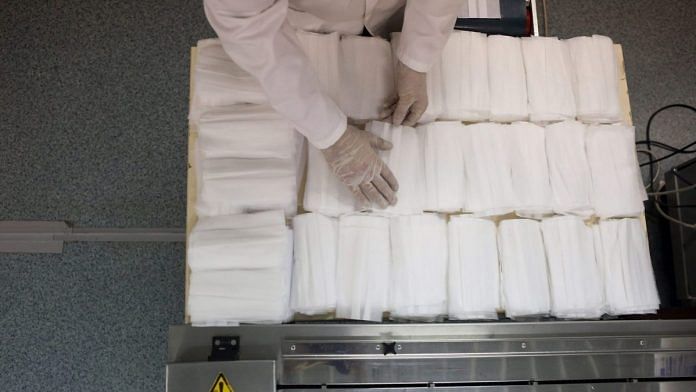It takes economics students a couple of classes to understand why price caps are generally a bad idea. The Italian government has nonetheless chosen to set one for face masks — and it’s learning the lesson the hard way.
The problem with picking a price that’s artificially low is that it will cause shortages. Consumers will want to buy too many of the items, while suppliers will produce too few because of the lack of incentive. That is what’s happening in Italy after the government said surgical masks should cost 50 euro cents (54 cents), excluding VAT.
Pharmacists say they are struggling to replenish their stocks, as foreign producers prefer to sell their goods elsewhere. Domestically, a number of Italian businesses that had reconverted their production lines to make masks now say the price is just too low to meet their costs. The government says it will compensate those pharmacists who’ve paid more for their masks than the sale price, but that won’t solve the scarcity problem.
Rome’s intentions are good. Scientists believe that face masks can help contain the spread of Covid-19, especially in places where social distancing is hard, such as on public transport. The Italian government is recommending their use, and some local authorities have made them compulsory in many settings. Letting citizens purchase face masks at a reasonable price isn’t just about being fair to the poorest citizens; it will also make the mask policy more effective, since it will boost compliance and help reduce the risk of contagion. Or at least that’s the theory.
As the Italian government has discovered, setting a maximum price must be part of a broader strategy. This is one of those occasions where the state can play a direct role. Above all, it needs to make sure there is sufficient supply from local and foreign producers. The government can then purchase these goods at their market price, and distribute them at whatever price it wishes. If it has to pay more than the price at which the masks are sold to the public, then so be it. This would also allow it to prioritize any parts of the population that it deems a priority, such as doctors, nurses or other essential workers.
Italy isn’t the only country to fix the price for face masks. South Korea and Taiwan have done it too. However, the first step for both of those governments was to increase local production or, at least, to heavily centralize distribution. Today, Taiwan can produce 17 million masks a day for a population of 24 million.
On March 5, the South Korean government announced it would purchase 80 percent of its national production. Italy is taking steps in this direction, but the price-cap fiasco risks delaying its efforts. Malta has followed Italy and set a price at 0.95 euros, although pharmacists there initially complained that this level was too low.
Italy’s face-mask struggles have broader economic implications in a time of pandemic. Many companies around the world are seeking state support as they struggle in a depressed economy, and politicians may be tempted to use their newfound powers to force artificially low prices. Before they do that, they’d better read the first couple of chapters of a basic economics textbook. – Bloomberg
Also read: Winter is coming for Australia, along with fears of spike in Covid infections



